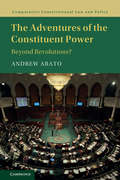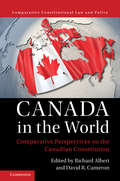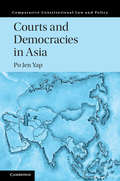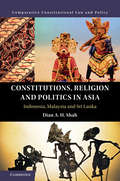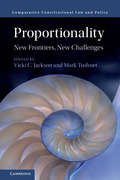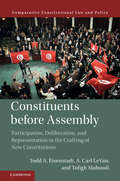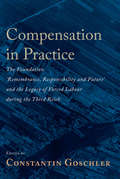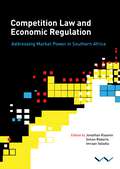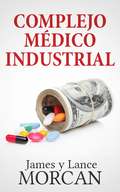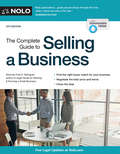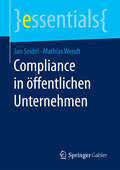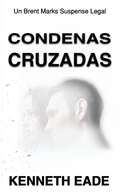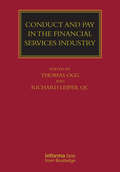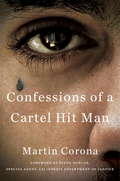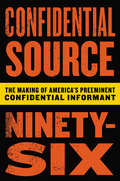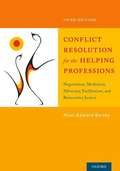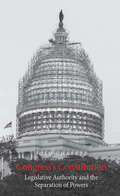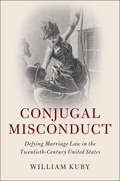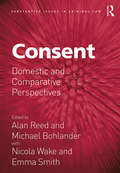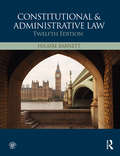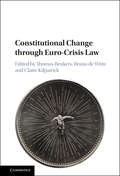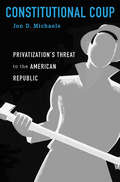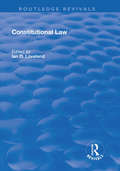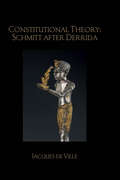- Table View
- List View
Comparative Constitutional Law and Policy: Beyond Revolutions? (Comparative Constitutional Law and Policy)
by Andrew AratoConstitutions are made in almost all transformation of regimes. What are the dangers and the hopes associated with such a process? What can make constitution-making legitimate? The Adventures of the Constituent Power explores the democratic methods by which political communities make their basic law, arguing that the most advanced method developed from Spain and South Africa. The first part of this book focuses on history of the idea of constitution-making, before and during the democratic revolutions of the 18th Century. The second part traces the notion of the constituent power in recent regime transitions that were consciously post-revolutionary, from Spain to South Africa. With the return of revolutions or revolutionary patterns of constitution-making, the book examines the use and potential failure of the new ideas available. The third part then proceeds to consider the type of constitution that is likely to emerge from the post-sovereign process.
Comparative Constitutional Law and Policy: Comparative Perspectives on the Canadian Constitution (Comparative Constitutional Law and Policy)
by Cameron David R. Richard AlbertIn this volume marking the Sesquicentennial of Confederation in Canada, leading scholars and jurists discuss the evolution of the Canadian Constitution since the British North America Act 1867; the role of the Supreme Court in interpreting the Constitution as a 'living tree' capable of application to new legal issues; and the growing influence of both the Constitution, with its entrenched Charter of Rights and Freedoms, and the decisions of the Court on other constitutional courts dealing with a wide range of issues pertaining to human rights and democratic government. The contributors assess how the Canadian Constitution accommodates the cultural diversity of the country's territories and peoples while ensuring the universal applicability of its provisions; the role of the Court in interpreting and applying the Constitution; and the growing global influence of the Constitution and decisions of the Court on legislatures and courts in other countries.
Comparative Constitutional Law and Policy: Courts and Democracies in Asia (Comparative Constitutional Law and Policy)
by Yap Po JenWhat is the relationship between the strength of a country's democracy and the ability of its courts to address deficiencies in the electoral process? Drawing a distinction between democracies that can be characterised as 'dominant-party' (for example Singapore, Malaysia, and Hong Kong), 'dynamic' (for example India, South Korea, and Taiwan), and 'fragile' (for example Thailand, Pakistan ,and Bangladesh), this book explores how democracy sustains and is sustained by the exercise of judicial power. In dominant-party systems, courts can only pursue 'dialogic' pathways to constrain the government's authoritarian tendencies. On the other hand, in dynamic democracies, courts can more successfully innovate and make systemic changes to the electoral system. Finally, in fragile democracies, where a country regularly oscillates between martial law and civilian rule, their courts tend to consistently overreach, and this often facilitates or precipitates a hostile take-over by the armed forces, and lead to the demise of the rule of law.
Comparative Constitutional Law and Policy: Indonesia, Malaysia and Sri Lanka (Comparative Constitutional Law and Policy)
by Shah Dian A. H.As religious polarisation in society deepens, political actors and policy-makers have begun to struggle with questions on the role of the dominant religion and how religion influences constitutional commitments and development. By focusing on Indonesia, Malaysia and Sri Lanka, Constitutions, Religion and Politics in Asia demonstrates how constitution-making and the operation of constitutional arrangements involving religion cannot be separated from the broader political dynamics of society. Although constitutions establish legal and political structures of government institutions and provide tools for rights protection, they do not operate in a vacuum divorced from the games of power and the political realities surrounding them. Here, Shah sets out how constitutions operate and evolve and demonstrates how constitutional provisions can produce unintended consequences over time. A vital new source of scholarship for students and scholars of law and religion and comparative constitutional law, and those interested in issues of constitutionalism and legal and political history in Asia.
Comparative Constitutional Law and Policy: New Frontiers, New Challenges (Comparative Constitutional Law and Policy)
by Mark Tushnet Jackson Vicki C.With contributions from leading scholars in constitutional law, this volume examines how carefully designed and limited doctrines of proportionality can improve judicial decision-making, how it is applied in different jurisdictions, its role on constitutionalism outside the courts, and whether the principle of proportionality actually advances or detracts from democracy. Contributions from some of the seminal thinkers on the development of scholarship on proportionality (e. g. Alexy, Barak, and Beatty) extend their prior work and engage in an important dialogue on the topic. Some offer substantial critiques, others defend the doctrine and offer important clarifications and extensions of their prior work. Throughout, the authors engage not only with case law from around the world but also with existing scholarly treatments of the subject. Mathematical treatments are avoided, making the book accessible to readers from both 'soft' and hard' social science backgrounds.
Comparative Constitutional Law and Policy: Participation, Deliberation, and Representation in the Crafting of New Constitutions (Comparative Constitutional Law and Policy)
by Eisenstadt Todd A. Levan A. Carl Tofigh MaboudiUnder what circumstances do new constitutions improve a nation's level of democracy? Between 1974 and 2014, democracy increased in 77 countries following the adoption of a new constitution, but it decreased or stayed the same in 47 others. This book demonstrates that increased participation in the forming of constitutions positively impacts levels of democracy. It is discovered that the degree of citizen participation at the 'convening stage' of constitution-making has a strong effect on levels of democracy. This finding defies the common theory that levels of democracy result from the content of constitutions, and instead lends support to 'deliberative' theories of democracy. Patterns of constitutions are then compared, differentiating imposed and popular constitution-making processes, using case studies from Chile, Nigeria, Gambia, and Venezuela to illustrate the dynamics specific to imposed constitution-making, and case studies from Colombia, Ecuador, Egypt, and Tunisia to illustrate the specific dynamics of popular constitution-making.
Comparative Constitutional Reasoning
by András Jakab Arthur Dyevre Giulio ItzcovichTo what extent is the language of judicial opinions responsive to the political and social context in which constitutional courts operate? Courts are reason-giving institutions, with argumentation playing a central role in constitutional adjudication. However, a cursory look at just a handful of constitutional systems suggests important differences in the practices of constitutional judges, whether in matters of form, style, or language. Focusing on independently-verified leading cases globally, a combination of qualitative and quantitative analysis offers the most comprehensive and systematic account of constitutional reasoning to date. This analysis is supported by the examination of eighteen legal systems around the world including the European Court of Human Rights and the European Court of Justice. Universally common aspects of constitutional reasoning are identified in this book, and contributors also examine whether common law countries differ to civil law countries in this respect.
Compensation in Practice: The Foundation 'Remembrance, Responsibility and Future' and the Legacy of Forced Labour during the Third Reich
by Constantin GoschlerFounded in 2000, the German Foundation "Remembrance, Responsibility and Future" is one of the largest transitional justice initiatives in history: in cooperation with its international partner organizations, it has to date paid over 4 billion euros to nearly 1.7 million survivors of forced labour during the Nazi Era. This volume provides an unparalleled look at the Foundation's creation, operations, and prospects after nearly two decades of existence, with valuable insights not just for historians but for a range of scholars, professionals, and others involved in human rights and reconciliation efforts.
Competition Law and Economic Regulation in Southern Africa: Addressing Market Power in Southern Africa
by Jonathan Klaaren Simon Roberts Imraan ValodiaShaping markets through competition and economic regulation is at the heart of addressing the development challenges facing countries in southern Africa. The contributors to Competition Law and Economic Regulation: Addressing Market Power in southern Africa critically assess the efficacy of the competition and economic regulation frameworks, including the impact of a number of the regional competition authorities in a range of sectors throughout southern Africa. Featuring academics as well as practitioners in the field, the book addresses issues common to southern African countries, where markets are small and concentrated, with particularly high barriers to entry, and where the resources to enforce legislation against anti-competitive conduct are limited. What is needed, the contributors argue, is an understanding of competition and regional integration as part of an inclusive growth agenda for Africa. By examining competition and regulation in a single framework, and viewing this within the southern African experience, this volume adds new perspectives to the global competition literature. It is an essential reference tool and will be of great interest to policymakers and regulators, as well as the rapidly growing ecosystem of legal practitioners and economists engaged in the field.
Complejo Médico Industrial
by David Arieta Galván James Morcan Lance MorcanComplejo Médico Industrial no es una crítica sin restricciones de la medicina convencional y los diferentes actores que componen una de las más grandes y rentables industria en el planeta. Incluyendo un prólogo por parte del farmacéutico retirado Denis Toovey (autor de Better Health for You: An Insider’s Big Picture Guide), este explosivo libro explora la discusión de que las Grandes Farmacéuticas y otros participantes en el sector del cuidado de la salud ponen las ganancias por delante del bienestar de los pacientes y los dólares antes que las vidas. Complejo Médico Industrial no deja duda de que algo malo ha sucedido en el campo médico y lo que debe ser la profesión más noble ha estado severamente comprometida por varios conflictos de interés. Los autores examinan esto en un lenguaje que cualquiera puede entender. En el proceso, hacen notar el desenfrenado mercantilismo, el egoísmo político y la academia dogmática que plaga a la industria. Se le recuerda al lector que existe mucha gente honorable en el negocio médico que está haciendo cosas increíbles por sus semejantes. Sin embargo, también se le recuerda que médicos, hospitales, la academia médica, las compañías farmacéuticas, los proveedores de equipo médico, aseguradoras y otros hacen su dinero de gente enferma, no saludable, y si todo el mundo estuviera sano muchos de los arriba mencionados estarían fuera del negocio… por lo que no está en sus intereses financieros curar enfermedades y males. Complejo Médico Industrial hace algunas fuertes preguntas. Como: ¿Es tu médico uno de esos que recibe sobornos de compañías farmacéuticas? ¿Qué tan peligrosos son nuestros hospitales para los pacientes? ¿Las compañías farmacéuticas hacen medicamentos o dinero? ¿Es inteligente que los padres vacunen a sus hijos? ¿Conoces las pruebas médicas que pueden matarte? ¿Las curas están siendo realmente ocultas? ¿Cuándo fue la última vez que tu méd
Complete Guide to Selling a Business, The
by Fred S. SteingoldThe most comprehensive, easy-to-use guide to selling a business available! Out there somewhere is a buyer looking to buy a business like yours -- so if you're ready to sell, make sure that you protect your interests and maximize your profit with The Complete Guide to Selling a Business. It covers: getting your business ready to sell pricing your business and valuing your assets finding the right buyer analyzing the tax issues negotiating a payment plan and other terms of sale planning your future relationship with the business limiting your liability working with lawyers, accountants and brokers closing the deal and transferring the business to its new owner The Complete Guide to Selling a Business helps you create more than two dozen crucial documents for both asset and entity sales, including: the sales agreement confidentiality letter promissory notes and security agreements noncompete and consulting agreements closing checklists This edition edition is completely updated with the latest tax considerations, and now provides more advice on marketing the sale of your business. There are literally dozens of competing titles on the market, but none can match The Complete Guide to Selling a Business for sheer depth, accuracy and ease of use.
Compliance in öffentlichen Unternehmen (essentials)
by Jan Seidel Mathias WendtDas essential beleuchtet die spezifischen Risiken der persönlichen Haftung für öffentliche Unternehmen. Die Autoren lassen ihre Erfahrungen aus der Errichtung und Prüfung von Compliance-Strukturen in Unternehmen der öffentlichen Hand einfließen. Die Entwicklung der Rechtsprechung in jüngerer Zeit hat gezeigt, dass die Risiken der persönlichen Haftung auch für Entscheider in Unternehmen der öffentlichen Hand ein relevantes Berufsrisiko darstellen. Dabei spielt die Organisationsform (öffentlich-rechtlich oder privatrechtlich) keine nennenswerte Rolle.
Condenas cruzadas
by Kenneth Eade Ana Claudia Macoretta¡Realmente un divorcio puede ser mortal! Experimenta el suspense y el misterio de la última novela de intriga jurídica éxito en ventas, de este galardonado autor de quien los críticos comentan que es: "Uno de los mejores escritores de intriga jurídica y judicial del momento". Una esposa que se enfrenta a un divorcio contrata a un asesino a sueldo para eliminar a su marido, luego cambia de opinión y aparece asesinada, o al menos así opinan la Policía y el abogado Brent Marks, que represente al esposo. No obstante, Marks tiene dudas sobre si su cliente ha tenido o no un papel activo en ese asesinato. Los comentarios de la crítica señalan: “Pocos autores del género de la intriga jurídica y judicial dominan la escena con la creatividad con que lo hace Kenneth Eade para presentar los hechos de modo que, con la ayuda de su protagonista, Brent Marks, podamos alcanzar a entender las complejidades jurídicas que nos rodean. Como ha quedado sobradamente dicho y repetido, Kenneth Eade es uno de los escritores contemporáneos más prominentes en el ámbito del suspense jurídico y el hecho de que escriba sus novelas basándose en el panorama filosófico actual exalta el interés en su trabajo.” Grady Harp, Amazon Hall of Fame, Top 100 and Vine Voice “En particular, los aficionados al suspense jurídico y judicial (incluso los recién llegados al mundo de Brent) quedarán satisfechos y deleitados por la línea realista de la narrativa y la progresión del argumento que hacen de esta obra una excepcional lectura que atraerá incluso a los seguidores más avezados de la novela policial de investigación.” Midwest Book Review “Condenas cruzadas” ha alcanzado la cumbre en los siguientes rubros de clasificación: #1 Éxito en nuevas publicaciones de Intriga Jurídica #1 Éxito en nuevas publicaciones de Suspense en encuadernación rústica #3 Éxito en ventas en nuevas publicaciones de
Conduct and Pay in the Financial Services Industry: The regulation of individuals (Lloyd's Commercial Law Library)
by Thomas Ogg Richard Leiper QcSince the financial crisis, one of the key priorities of the Financial Conduct Authority (FCA) and Prudential Regulation Authority (PRA) has been individual accountability. This book addresses the regulatory and employment law challenges that arise from the FCA’s and PRA’s requirements. The expert team of writers examine in depth the provisions of the Financial Services and Markets Act 2000 which relate to individuals, and the associated requirements of the PRA and FCA. The topics addressed include: The Senior Manager, Certification and Approved Person Regimes Regulatory references and whistleblowing Disciplinary investigations, enforcement and sanctions Notifications, ‘Form C’, and fitness & propriety Bonus disputes and the Remuneration Code Conduct and Pay in the Financial Services Industry considers the full extent of an individual’s employment, from pre-contractual discussions to the post-termination clawback of remuneration. It is a vital reference for lawyers and human resources professionals working within the financial services industry, both in-house and in private practice. It will also be of interest to all academics, regulators and policy-makers involved in this sector.
Confessions of a Cartel Hit Man
by Tony Rafael Martin CoronaThe true confession of an assassin, a sicario, who rose through the ranks of the Southern California gang world to become a respected leader in an elite, cruelly efficient crew of hit men for Mexico's "most vicious drug cartel," and eventually found a way out and an (almost) normal life. Martin Corona, a US citizen, fell into the outlaw life at twelve and worked for a crew run by the Arellano brothers, founders of the the Tijuana drug cartel that dominated the Southern California drug trade and much bloody gang warfare for decades. Corona's crew would cross into the United States from their luxurious hideout in Mexico, kill whoever needed to be killed north of the border, and return home in the afternoon. That work continued until the arrest of Javier Arellano-Félix in 2006 in a huge coordinated DEA operation. Martin Corona played a key role in the downfall of the cartel when he turned state's evidence. He confessed to multiple murders. Special Agent of the California Department of Justice Steve Duncan, who wrote the foreword, says Martin Corona is the only former cartel hit man he knows who is truly remorseful. Martin's father was a US Marine. The family had many solid middle-class advantages, including the good fortune to be posted in Hawaii for a time during which a teenage Martin thought he might be able to turn away from the outlaw life of theft, drug dealing, gun play, and prostitution. He briefly quit drugs and held down a job, but a die had been cast. He soon returned to a gangbanging life he now deeply regrets. How does someone become evil, a murderer who can kill without hesitation? This story is an insight into how it happened to one human being and how he now lives with himself. He is no longer a killer; he has asked for forgiveness; he has made a kind of peace for himself. He wrote letters to family members of his victims. Some of them not only wrote back but came to support him at his parole hearings. It is a cautionary tale, but also one that shows that evil doesn't have to be forever.
Confidential Source Ninety-Six: The Making Of America's Preeminent Confidential Informant
by C. S. 96A HARROWING JOURNEY INSIDE THE HIDDEN WORLD OF DRUG CARTELS BY ONE OF THE TOP CRIMINAL INFORMANTS IN U.S. LAW ENFORCEMENT HISTORY.The men he put behind bars know him as Roman Caribe or one of the dozens of other aliases he has used undercover. His handlers in the DEA, ICE, and FBI know him as Confidential Source Ninety-Six, or C.S. 96, named for the year he confronted the sins of his life atop a massive drug distribution ring and flipped, becoming law enforcement's secret weapon. In Confidential Source Ninety-Six, Caribe tells the extraordinary story of his transformation into America's most successful informant in terms of total narcotics seized--from the years of trafficking cocaine and marijuana across the U.S. for a terrifying drug lord, eventually becoming that man's number two, to his decision to defect and trade sides. In his first mission, Caribe set his sights on his onetime boss's brutal operation. In his next, he broke all protocol and made a daring foray into the notorious Fuentes Cartel, where he took down a family that was smuggling tons of drugs across the U.S.-Mexico border.As Caribe launched his career as a confidential source, finding his faith and seeking to finally do right by his stoic wife, Inez, and his four children, his marriage became stressed in new ways, the risks to his family unimaginable if he made a single mistake on the job. He found himself looking over his shoulder every day, knowing that with each drug ring or kingpin he destroyed, he made another dangerous enemy. For as long as he continued the high stakes work, he would survive on the cunning of his tradecraft and his ability to improvise in the most terrifying circumstances. Unfolding in Southern California mansions, makeshift DEA trailers deep in the redwood forest, drug fronts in Spanish Harlem, fast-food parking lots where kilograms of cocaine and heroin change hands, and around the dinner table where Caribe began mentoring at-risk youth to help them avoid the mistakes he made, Confidential Source Ninety-Six is the epic saga of one man's quest to redeem himself and a thrilling look at the law enforcement battle that rages in the shadows of our nation.
Conflict Resolution For The Helping Professions: Negotiation, Mediation, Advocacy, Facilitation, and Restorative Justice
by Allan Edward BarskyWhen people think of conflict, they often think of fights, wars, arguments, hot tempers, and hurtful consequences. This book provides helping professionals with the theory, strategies, and skills they need to deal with conflict in a manner that is respectful, collaborative, and constructive. This text illustrates how helping professionals can incorporate evidence-based models of conflict resolution to work more effectively and enjoyably with clients, coworkers, supervisors, and others. Practitioners will learn how to respond effectively when others use power, positions, and competition. Whereas many conflict resolution texts focus on one method or approach to practice, this textbook provides practitioners with various models that they can incorporate in their roles as negotiators, counselors, mediators, facilitators, advocates, and peacebuilders.
Congress's Constitution: Legislative Authority and the Separation of Powers
by Josh ChafetzA leading scholar of Congress and the Constitution analyzes Congress’s surprisingly potent set of tools in the system of checks and balances. Congress is widely supposed to be the least effective branch of the federal government. But as Josh Chafetz shows in this boldly original analysis, Congress in fact has numerous powerful tools at its disposal in its conflicts with the other branches. These tools include the power of the purse, the contempt power, freedom of speech and debate, and more. Drawing extensively on the historical development of Anglo-American legislatures from the seventeenth century to the present, Chafetz concludes that these tools are all means by which Congress and its members battle for public support. When Congress uses them to engage successfully with the public, it increases its power vis-à-vis the other branches; when it does not, it loses power. This groundbreaking take on the separation of powers will be of interest to both legal scholars and political scientists.
Conjugal Misconduct: Defying Marriage Law in the Twentieth-Century United States (Cambridge Historical Studies in American Law and Society)
by William KubyConjugal Misconduct reveals the hidden history of controversial and legally contested marital arrangements in twentieth-century America. William Kuby examines the experiences of couples in unconventional unions and the legal and cultural backlash generated by a wide array of 'alternative' marriages. These include marriages established through personal advertisements and matchmaking bureaus, marriages that defied state eugenic regulations, hasty marriages between divorced persons, provisional and temporary unions referred to as 'trial marriages', racial intermarriages, and a host of other unions that challenged sexual and marital norms. In illuminating the tensions between those who set marriage policies and those who defied them, Kuby offers a fresh account of marriage's contested history, arguing that although marital nonconformists composed only a small minority of the population, their atypical arrangements nonetheless shifted popular understandings of marriage and consistently refashioned the legal parameters of the institution.
Consent: Domestic and Comparative Perspectives (Substantive Issues in Criminal Law)
by Alan Reed Emma Smith Michael Bohlander Nicola WakeThis volume presents a leading contribution to the substantive arena relating to consent in the criminal law. In broad terms, the ambit of legally valid consent in extant law is contestable and opaque, and reveals significant problems in adoption of consistent approaches to doctrinal and theoretical underpinnings of consent. This book seeks to provide a logical template to focus the debate. The overall concept addresses three specific elements within this arena, embracing an overarching synergy between them. This edifice engages in an examination of UK provisions, with specialist contributions on Irish and Scottish law, and in contrasting these provisions against alternative domestic jurisdictions as well as comparative contributions addressing a particularised research grid for consent. The comparative chapters provide a wider background of how other legal systems' treat a variety of specialised issues relating to consent in the context of the criminal law. The debate in relation to consent principles continues for academics, practitioners and within the criminal justice system. Having expert descriptions of the wider issues surrounding the particular discussion and of other legal systems' approaches serves to stimulate and inform that debate. This collection will be a major source of reference for future discussion.
Constitutional & Administrative Law
by Hilaire BarnettHilaire Barnett’s Constitutional and Administrative Law has provided generations of students with reliable, accessible and comprehensive coverage of the Public Law syllabus. Mapped to the common course outline, it equips students with an understanding of the constitution’s past, present and future by analysing and illustrating the political and socio-historical contexts which have shaped the major legal rules and principles of public law, as well as on-going constitutional reform. The 12th edition will address key recent developments including: The referendum result on the UK’s membership of the EU and its ongoing impact on constitutional and administrative law The continuing process of devolution to the nations Terrorism and national security Future developments, particularly in relation to 'Brexit' will be discussed in regular updates to the companion website.
Constitutional Change Through Euro-Crisis Law
by Thomas Beukers De Witte Bruno Claire KilpatrickConstitutional Change through Euro-Crisis Law contains a comparative constitutional analysis of the impact of a very broad range of euro-crisis law instruments on the EU and national constitutions. It covers contrasting assessments of the impact of euro-crisis law on national parliaments, various types of criticism on the EU economic governance framework, different views on what is needed to improve the multilevel system of economic governance, and valuable insights into the nature of emergency discourse in the legislative arena and of the spillover from the political to the judicial sphere. In addition, it deals with how bailout countries, even if part of the same group of euro area Member States subject to a programme, have reacted differently to the crisis.
Constitutional Coup: Privatization’s Threat to the American Republic
by Jon D. MichaelsAmericans hate bureaucracy—though they love the services it provides—and demand that government run like a business. Hence today’s privatization revolution. Jon Michaels shows how the fusion of politics and profits commercializes government and consolidates state power in ways the Constitution’s framers endeavored to disaggregate.
Constitutional Law (Routledge Revivals)
by Ian D. LovelandThis title was first published in 2000: This volume of essays explores a number of fundamental constitutional law questions in a variety of historical and jurisdictional contexts. The contributions focus on the role to be played by courts and legal principles in the resolution of major political controversies and on the progressive development of constitutional jurisprudence in countries sharing a broadly common law legal tradition. The guiding theme pervading the collection is an attempt to measure the legitimacy of judicial (in-)activism when courts are faced with difficult political choices on matters such as slavery, internment, racism and voting rights and radical economic policies and are also confronted with the requirement to attach concrete meanings to such abstract concepts as the separation of powers and the rule of law.
Constitutional Theory: Schmitt After Derrida (Birkbeck Law Press)
by Jacques de VilleThis book advances a new reading of the central works of Carl Schmitt and, in so doing, rethinks the primary concepts of constitutional theory. In this book, Jacques de Ville engages in a close analysis of a number of Schmitt’s texts, including Dictatorship (1921), The Concept of the Political (1927), Constitutional Theory (1928), Land and Sea (1942), Ex Captivitate Salus (1950), The Nomos of the Earth (1950) and The Theory of the Partisan (1963). This engagement takes place from the perspective of constitutional theory and focuses specifically on concepts or themes such as sovereignty, the state, the political, constituent power, democracy, representation, the constitution and human rights. The book seeks to rethink the structure of these concepts in line with Derrida’s analysis of Schmitt’s texts on the concept of the political in Politics of Friendship (1993). This happens by way of an analysis of Derrida’s engagement with Freud and other psychoanalysts. Although the main focus in the book is on Schmitt’s texts, it further examines two texts of Derrida (Khōra (1993) and Fors: The Anglish Words of Nicholas Abraham and Maria Torok (1976)), by reading these alongside Schmitt’s own reflections on the positive concept of the constitution.
